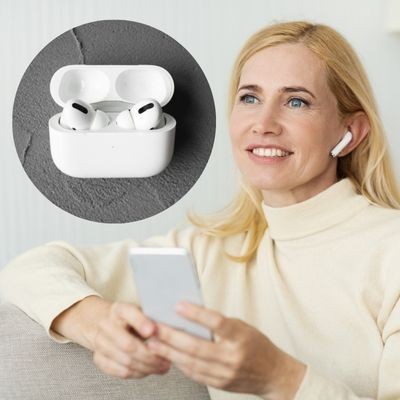
Head of Online Medical Content

Audiology Expert at Hearing Aid UK

Over the Counter Hearing Aids (OTC)
Are OTC hearing aids right for you?
Overview | The limitations | Prices | Why are OTC hearing aids controversial | The Truth and Dangers | Main disadvantages | Conclusion
What are over-the-counter hearing aids?
Over-the-counter (OTC) hearing aids are hearing devices that can be purchased without a prescription from a healthcare provider. These devices are intended to help those with mild to moderate hearing loss and are typically less expensive and less complex than prescription hearing aids.
Mail-order hearing aids have been around for decades and have always been quite controversial. Previously, these were mainly sold via small adverts at the back of magazines and newspapers, but have moved to selling through pop-up mail order websites.
Though they are commonly marketed as hearing aids, most are in fact just sophisticated amplifiers. They are delivered pre-programmed and ready to use. All you do is put them in and switch them on.
Consumers believe that over-the-counter hearing aids are one possible way of avoiding the expense, but are they worth it? Below ,we go through some facts about these devices, so you can make a more educated decision about over-the-counter hearing aids and whether they are right for you.
The limitations of OTC hearing aids
Over-the-counter hearing aids are not designed to help people with severe or complex hearing loss and are not for people who find background noise or social situations challenging. They are predominantly used to assist those with simple hearing losses in hearing in a quiet environment.
Over-the-counter hearing aids are also marketed and known as: Assisted Listening Devices / ALD, Personal Sound Amplification Products / PSAP, off-the-shelf hearing aids, and hearables.
Over the counter hearing aid prices
So, what do the over-the-counter hearing aids cost? With so many OTC hearing aids out there in today’s market, a lot of consumers believe they are a more affordable option when compared to private audiologists. To give you an idea, on average, these hearing aids range from £99 to £500 per device.
These affordable over-the-counter hearing aids are trying to make hearing aids more accessible, catering to low-level hearing loss to consumers who maybe can't afford them. Whilst, the idea is perhaps exciting for some, it is still a rather controversial one within the audiology industry.
Why are OTC hearing aids controversial?
When you see beyond the cost, over the counter hearing aids come with a plethora of disadvantages. There is a very real potential for damage to consumers' ears from over-amplification from these devices, as they are not set to your hearing loss, and therefore, it doesn't know where to limit the volume.
Another concern is when people purchase over-the-counter hearing aids and don’t find them successful – they could lose faith in hearing aids completely. It often puts people off for years, as they think that hearing aids don't work for them.
This could potentially bring on social, mental and health problems due to the lack of professional diagnosis, the right treatment and aftercare.
So, what are the over-the-counter hearing aid options?
Online hearing aid suppliers that sell over the counter hearing aids have a range of devices to choose from, such as the ITE and BTE styles you might be familiar with. However, the range available is limited in comparison to hearing aids from a private audiologist.
Over the counter hearing aid brands
There are a few mail-order hearing aid companies now, but the most popular of them seem to be Lively, Eargo, MDHearingAid, and Audicus. However, we are unsure how accessible these products are in the UK. In regard to over-the-counter hearing aids with Bluetooth, all these brands tick this box on some level and can, in some cases, be compatible with your phone.

Do over-the-counter hearing aids work?
The Truth and Dangers of OTC Hearing Aids
Over the counter hearing aid reviews from our audiologists
Are over-the-counter hearing aids effective? Compared to NHS hearing aids or private hearing aids, which are programmed and fitted by a professional with your hearing loss needs in mind, over the counter hearing aids only offer what the packaging says.
The idea is that you browse online, see which hearing aid is the right 'fit' for you, add it to the cart and then a few days later, your devices are delivered to you.
What technology is included in over-the-counter hearing aids?
Over-the-counter hearing aids are marketed to consumers as pre-programmed devices that are compatible with mild to moderate hearing loss. An example of this would be hearing loss, which is caused by ageing.
This hearing loss is generally when you find hearing high-frequency sounds more challenging than lower frequencies. Over-the-counter hearing aid technology is limited and only offers basic amplification of said high-frequency sounds.
Over the Counter hearing aid devices - It's all down to the consumer’s choice
When today's consumers decide to purchase an over-the-counter hearing aid online, the selection process is solely in their hands. This means there will be no help from a qualified audiologist who would naturally diagnose and identify their hearing loss level and then assist and support them in their decision-making process.
A process that successfully navigates the right hearing aid with the most beneficial features for them, ensuring that they will always hear at their best.
Another worrying thought is that there is no hearing test required, so what exactly is the best way to judge the right hearing aid? If you do have audiogram results, who will interpret these correctly?
Arguably, we believe that buying an over-the-counter hearing aid is similar to purchasing heart medication from another country without a prescription. It’s a huge gamble and one you realistically wouldn’t think about doing.
You might not even need hearing aids!
Hearing loss can be a symptom of other health issues such as kidney disease, diabetes and cardiovascular disease. Purchasing and wearing over-the-counter hearing aids and amplifying sounds when you don't have hearing loss is dangerous.
If you are thinking about buying these hearing aids and may have underlying health issues, we advise that you seek medical help before considering purchasing.
Why are off-the-counter hearing aids so cheap?
A lot of people wonder why OTC hearing aids are so inexpensive. It's a simple answer that most people with age-related hearing loss will have worked out themselves by now. "You get what you pay for."
You are buying them from an online supplier without the appropriate programming and adjustments hearing loss requires and needs.
Are there any hidden costs to over-the-counter hearing aids?
It all depends on what company you go with, as there could potentially be various costs to pay, as well as the device price itself. This could be a hearing aid warranty (if not included), repairs, batteries and so on. Aftercare will also have to be sourced and paid for by you.
Something else worth mentioning is that if the hearing aid supplier you bought your hearing aids from cannot provide aftercare - you will have to find someone who can. In reality, most private audiologists will not have the access or means to carry out any hearing healthcare service with over-the-counter hearing aids.
They can only support and look after patients who haven't bought hearing aids from them, but currently have hearing aids from a manufacturer they know and work with.
Main disadvantages of OTC hearing aids
Looking at over the counter hearing aids as a generalisation, here is what we believe to be the main cons of this type of hearing aid.
- No fine-tuning: There is no personalisation of features to cater to your unique hearing loss as well as no bespoke fitting. It's really a 'one size fits all' product and an 'every hearing loss is the same' approach.
- No support for aftercare: Most mail-order hearing aid companies offer no aftercare or support services after you have purchased your devices. You don't benefit from the level of support you get from an audiologist to guide you on your hearing loss journey and your future hearing needs.
- Lack of quality: Over the counter hearing aids naturally lack the quality of sound, technology and the device casing itself. They just amplify sounds rather than enhance your listening experience.
- No warranty: OTC hearing aids don't include a warranty or insurance if anything were to happen to your devices. Although this is improving over time, we are unsure of the customer service or repair process.

Over the counter digital hearing aids
What if over-the-counter hearing aids don't work for me?
OTC hearing aids are a risk
This is always a common worry that consumers have when they are researching over-the-counter hearing aids. This is a natural thought, as ordering something online is often not what you expect when it arrives.
There is a huge element of risk involved in such a purchase. However, in some cases, there might be a 30-day returns policy if the hearing aid is not right for you.
What do we honestly think about over-the-counter hearing aids?
In the past, when patients have been looking for the best over the counter hearing aids and then ask us, "Are over the counter hearing aids any good?" - we always answer honestly. This means advising those who are thinking about purchasing an over-the-counter hearing aid to think again.
Yes, you might get some simple amplification, but inferior products like these generally don't assist your hearing. There is also a genuine risk that it could do more damage than good to your hearing long term.
We understand that budget is a huge factor in getting a hearing aid. As independent private audiologists ourselves we are proud to offer exceptional hearing healthcare service, a great scope of hearing aid choices from the best manufacturers and the highest level of technology.
We are also transparent about our prices and offer some of the lowest in the UK. That being said, when the budget is restricted, we would rather recommend customers go to the NHS for their hearing healthcare than purchase OTC hearing aids.
Changing attitudes
On the other hand, people would argue that over-the-counter hearing aids have normalised and popularised hearing aids. Which we hope will go some way to changing negative attitudes towards them.
As the dated hearing solution design and concept make way for a more modern way of design, lifestyle and audiology, it has the potential to inspire people to seek an earlier diagnosis.
Conclusion
It's important to remember that there are many drawbacks to using OTC hearing aids. They are not as effective as prescription hearing aids in addressing more severe or complex hearing loss, and they may not be tailored to the individual's specific hearing needs.
OTC hearing aids also do not include the advanced features and technologies found in prescription hearing aids, such as noise reduction or wireless connectivity.
Why Choose Us?
- FREE Hearing Tests
- Best Hearing Aids and Prices
- FREE Aftercare for Life
- FREE Home Visits
- 200+ Local Audiologists
- 60 Day Money Back Guarantee
Need more information on and support with OTC hearing aids?
If you are considering using an OTC hearing aid, it is important to carefully research the available options and consider your specific hearing needs. It may be helpful to consult with a hearing healthcare professional or a trusted healthcare provider to determine the best solution for your hearing loss.
Please call us free on 0800 567 7621 for any additional advice and support on OTC hearing aids. We can assist you in your hearing healthcare going forward and put you in touch with the right audiologist local to you.
Hearing aid advice articles you might like...
 Do Hearing Aids Work for Everyone?
Do Hearing Aids Work for Everyone?  Wearing Hearing Aids with Glasses
Wearing Hearing Aids with Glasses  Risks of Wearing Apple AirPod Pro 2's
Risks of Wearing Apple AirPod Pro 2's If you are looking at this page then it is likely that an audiologist has suggested that you purchase this particular hearing aid, so is this the best model for you?
In general, any audiologist will always recommend to you the model that best suits your needs. Here is a useful checklist to make sure that is the case.
- Audiologist level of knowledge: The audiologist you have seen will hopefully have a wide knowledge of all available hearing aids, however, some will only be familiar with a small number of brands and therefore may not really be in a position to know which model is the best for you. It is OK to challenge their recommendation and ask them to justify why this particular brand is the one for you.
- Do research: Read about the hearing aid that was recommended. Does it seem like it will suit your lifestyle? Does it have more or fewer features than you need?
- Be aware of sales targets: Many high street retailers have specific tie-ins to a particular manufacturer/brand. The hearing aid they have suggested may still be the correct one for you, but do your research so that you know why they might have recommended it.
If in doubt, feel free to give us a call. That's what we're here for. In the meantime, read all about our review of the best hearing aids for 2025 here
If you have significant hearing loss in both ears, you should be wearing two hearing aids. Here are the audiological reasons why:
Localisation: The brain decodes information from both ears and compares and contrasts them. By analysing the minuscule time delays as well as the difference in the loudness of each sound reaching the ears, the person is able to accurately locate a sound source. Simply put, if you have better hearing on one side than the other, you can't accurately tell what direction sounds are coming from.
Less amplification is required: A phenomenon known as “binaural summation” means that the hearing aids can be set at a lower and more natural volume setting than if you wore only one hearing aid.
Head shadow effect: High frequencies, the part of your hearing that gives clarity and meaning to speech sounds, cannot bend around your head. Only low frequencies can. Therefore if someone is talking on your unaided side you are likely to hear that they are speaking, but be unable to tell what they have said.
Noise reduction: The brain has its own built-in noise reduction which is only really effective when it is receiving information from both ears. If only one ear is aided, even with the best hearing aid in the world, it will be difficult for you to hear in background noise as your brain is trying to retain all of the sounds (including background noise) rather than filtering it out.
Sound quality: We are designed to hear in stereo. Only hearing from one side sounds a lot less natural to us.
Fancy some further reading on this topic? You can read about why two hearing aids are better than one in our article, hearing aids for both ears, here
For most people, the main benefit of a rechargeable hearing aid is simple convenience. We are used to plugging in our phones and other devices overnight for them to charge up. Here are some other pros and cons:
For anybody with poor dexterity or issues with their fingers, having a rechargeable aid makes a huge difference as normal hearing aid batteries are quite small and some people find them fiddly to change.
One downside is that if you forget to charge your hearing aid, then it is a problem that can't be instantly fixed. For most a 30-minute charge will get you at least two or three hours of hearing, but if you are the type of person who is likely to forget to plug them in regularly then you're probably better off with standard batteries.
Rechargeable aids are also a little bit bigger and are only available in Behind the Ear models.
Finally, just like with a mobile phone, the amount of charge you get on day one is not going to be the same as you get a few years down the line. Be sure to ask what the policy is with the manufacturer warranty when it comes to replacing the battery.
Looking for more information on rechargeable hearing aids? Read our dedicated page on the topic here
For most people, the answer is yes. But it's never that simple.
The majority of hearing problems affect the high frequencies a lot more than the low ones. Therefore open fitting hearing aids sound a lot more natural and ones that block your ears up can make your own voice sound like you are talking with your head in a bucket. Therefore in-ear aids tend to be less natural.
However the true answer is we can't tell until we have had a look in your ears to assess the size of your ear canal, and until we have tested your hearing to see which frequencies are being affected.
People with wider ear canals tend to have more flexibility, also there are open fitting modular CIC hearing aids now that do not block your ears.
There is also the age old rule to consider, that a hearing aid will not help you if it's sat in the drawer gathering dust. If the only hearing aid you would be happy wearing is one that people can't see, then that's what you should get.
Most people can adapt to any type of hearing aid, as long as they know what to expect. Have an honest conversation with your audiologist as to what your needs are.
Generally speaking, six or more. Unless it's none at all.
The number of channels a hearing aid has is often a simplistic way an audiologist will use to explain why one hearing aid is better than another, but channels are complex and it is really not that straightforward. Here are some reasons why:
Hearing aids amplify sounds of different frequencies by different amounts. Most people have lost more high frequencies than low and therefore need more amplification in the high frequencies. The range of sounds you hear are split into frequency bands or channels and the hearing aids are set to provide the right amount of hearing at each frequency level.
Less than six channels and this cannot be done with much accuracy, so six is the magic number. However, a six channel aid is typically very basic with few other features and is suitable only for hearing a single speaker in a quiet room. The number of channels is not what you should be looking at, it's more the rest of the technology that comes with them.
As a final note, different manufacturers have different approaches. One method is not necessarily better than any other. For example, some manufacturers have as many as 64 channels in their top aids. Most tend to have between 17 and 20. One manufacturer has no channels at all.
Hearing aids are easily lost, misplaced or damaged and typically are one of the most expensive personal possessions an individual can own. We offer hearing aid warranty coverage for £80 per year per aid. Find out more about this service we provide here
All our audiologists use the very latest technology and provide the full range of tests to accurately measure your hearing for free. Find out about what hearing healthcare services we offer all our customers here
Hearing Aid UK offers all their customers free home visiting services, even in a care home environment, for no extra cost. Including hearing tests, fittings, maintenance, check-ups and much more in the comfort of your own home and at your convenience. Find out more information about our home visits here
Here, at Hearing Aid UK, we are dedicated to offering low hearing aid prices. We achieve this by having no head office and low marketing costs. Our hearing aid prices are amongst the lowest you will find anywhere in the world. Explore our prices, brands, and models here
What's included in our hearing aid prices?
Our specialist service includes:
Do not spend hundreds of pounds without getting a second opinion from us.
Please call us on 0800 567 7621
 Not only are the prices great, but the service is fantastic! Many thanks to your team.
Not only are the prices great, but the service is fantastic! Many thanks to your team.Other pages you might find useful
Ask the Experts
6 Morton Lane
Walkwood
Redditch
Worcestershire
B97 5QA
Latest Launch
When we refer to a product as 'Latest Launch', we mean it is the latest to be released on the market.
New
When we refer to a product as 'New', we mean that the product is the newest hearing aid model on the market.
When we refer to a product as 'Superseded', we mean that there is a newer range available which replaces and improves on this product.
Older Model
When we refer to a product as an 'Older Model', we mean that it is has been superseded by at least two more recent hearing aid ranges.
